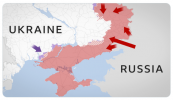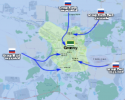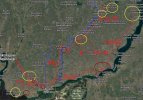Much attention was drawn to the latest information that 110,000 civilians were killed in the Battle of Mariupol. Is this data reliable? Is it possible for the city to lose more than 25% of its population as a result of the Russian invasion? Some comments on my part
Originally I wrote a sketch of the whole story wall, but I figured it was too poor to analyze. So instead of it, I will write a few comments that may be a contribution to the discussion about the tragedy in Mariupol.
The first, quite obvious - is that we can only speculate so far. The only real data on the civilian casualties of the battle for Mariupol can be provided by reliable on-site research by experts. AU's rebound in Mariupol is not expected any time soon.

Moreover, there is a high risk that it will be difficult to know real statistics even in the event of Mariupol's rebound. Two problems: reports of Russian crematoria and an unidentified number of missing persons (deported to Russia).
https://abcnews.go.com/Internationa...cinerate-civilians-mariupol/story?id=83932376
Secondly, is this shocking number of "25% of the city's population" really such a cosmic number, unrealistic on the modern battlefield? Not necessarily. Historical examples provide interesting insight into the situation.
Well, according to the 1989 census, Grozny had a population of almost 400,000, very similar to Mariupol. As a result of the first battle for Grozny (1994-1995), about 27,000 civilians were killed. Rounding up, 6-7% of the entire city's population.


6-7% and 25% is a big difference, so now the question should be asked - what phenomena could have happened that the civil losses in Mariupol were much worse than in the first Battle of Grozny?
According to Human Rights Watch, 350,000 people had to escape from all of Chechnya. I do not have precise data, but 40% of the entire Chechnya population could have been accumulated in Grozny itself, if not more. This suggests that a lot of civilians were evacuated during the operation.
According to the BBC, 140,000 civilians were evacuated from Mariupol to the Ukrainian side, while 170,000 were stuck in the city. The BBC also notes that relatively few people have escaped through commonly agreed "humanitarian corridors."
https://www.bbc.com/news/world-europe-60894142
I have quite a strong suspicion that the evacuation of civilians from Mariupol went much worse than in Grozny. I also have doubts about the number of "140,000 evacuees". Data as to how many were evacuated (forcefully or not) to Russia are uncertain, but the most common is "20-30 thousand."
Now why the evacuation went so poorly, three reasons. The first: the speed of the Russian advance and a fairly quick circle around the city. It seems that the stream of people escaping from the city was quite wide and large, until the Russians actually surrounded Mariupol.
Secondly, the very low level of trust in the Russian army among civilians (even worse than in Chechnya), which could have made it safer from a civilian perspective to stay in a besieged city than to evacuate through Russian lines.
https://reliefweb.int/report/ukraine/ukraine-mariupol-residents-trapped-russian-assault-enuk
Thirdly, the lack of preparation of the Russian army for such a problem (evacuation of civilians, their protection), because, as we can guess from the Russian planning and military effectiveness, they did not plan at all that Ukraine would put up any military resistance.
It can also be added that the quality of the Russian units fighting for Mariupol was similar to the quality of the units taking part in the Battle of Grozny. The presence of the DNR and Kadyrovtsy forces has been noted, about which we cannot say much good.
Another note, the battle for Mariupol lasted a month shorter than the battle for Grozny. Is it a factor that increases or decreases potential civil losses? In my opinion, with full context - it magnifies. I explain why:
In the context of the war in Ukraine, the Russians conducted hostilities in Mariupol with enormous intensity, probably with a much greater use of artillery ammunition than in Grozny. At least that is my speculation.
This is the reason why the statistics from the Battle of Aleppo (2012-2016) look abstract. Yes, the losses in the entire province of Aleppo have been estimated at around 31,000, which is a lot. But it was a city of two million people, and the battle lasted four and a half years.
Without creating a separate thread, I would like to say that there were several different factors that meant that despite such a large city and such a population, civilian losses in Aleppo turned out to be smaller than one might imagine - and such losses did not occur in Mariupol.
To sum up, an honest answer to the question of how many civilians died in Mariupol is: “it is not known” (until it is properly investigated on the spot). Although I have some doubts about the number of 110 thousand (maybe missing?), I do not exclude it from the spot.
https://www.polskieradio.pl/395/976...ble-mass-graves-near-Ukraines-Mariupol-report
My assumptions are that when it comes to the humanitarian catastrophe, Mariupol was a worse case than Grozny, and as we recall, Grozny lost 6-7% of the population as a result of the battle of 1995-1996.
So if you were to hold a gun to my head and make me throw "how much do I estimate dead", my answer would probably be "50-70 thousand", which is about 15% of the city's population. Again - this is only speculation and I do not rule out larger numbers.
The truth is, however, that even if (theoretically) the losses among Mariupol's civilians were only, say, 20,000, it would still be statistically much more than the average urban operation in the US or its allies.

Russia simply cannot or does not want to act in urban struggles with respect for the civilian population, and Mariupol remains a huge tragedy. How great - you have to wait for Ukraine to win and the possibility of conducting research in the city itself.
Hänen lisäys ketjun kommenteista:
Practice (eg, Mosul and Rakka from modern cases) shows that the evacuation of civilians is the primary and most important measure. But in Mariupol it was clearly not done correctly, due to Russia's fault.











 Tarina ei kerro oliko aitoja natseja vai wannabe venäläisiä... Joka tapauksessa napa ukkojen tilit maksaa putleri
Tarina ei kerro oliko aitoja natseja vai wannabe venäläisiä... Joka tapauksessa napa ukkojen tilit maksaa putleri have you seen? Such a viral flies around the Ukrainian net
have you seen? Such a viral flies around the Ukrainian net 

